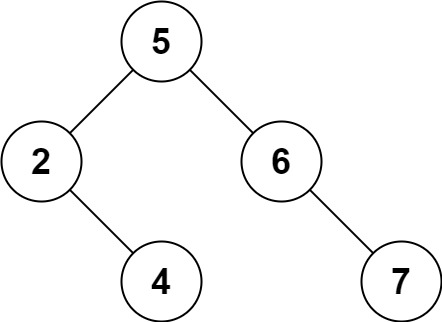Delete Node in a BST
Problem Statement - link #
Given a root node reference of a BST and a key, delete the node with the given key in the BST. Return the root node reference (possibly updated) of the BST.
Basically, the deletion can be divided into two stages:
- Search for a node to remove.
- If the node is found, delete the node.
Examples #
Example 1:

Input: root = [5,3,6,2,4,null,7], key = 3
Output: [5,4,6,2,null,null,7]
Explanation: Given key to delete is 3. So we find the node with value 3 and delete it.
One valid answer is [5,4,6,2,null,null,7], shown in the above BST.
Please notice that another valid answer is [5,2,6,null,4,null,7] and it's also accepted.

Example 2:
Input: root = [5,3,6,2,4,null,7], key = 0
Output: [5,3,6,2,4,null,7]
Explanation: The tree does not contain a node with value = 0.
Example 3:
Input: root = [], key = 0
Output: []
Constraints #
- The number of nodes in the tree is in the range
[0, 104]. -10^5 <= Node.val <= 10^5- Each node has a unique value.
- root is a valid binary search tree.
-10^5 <= key <= 10^5
Solutions #
/**
* Definition for a binary tree node.
* struct TreeNode {
* int val;
* TreeNode *left;
* TreeNode *right;
* TreeNode() : val(0), left(nullptr), right(nullptr) {}
* TreeNode(int x) : val(x), left(nullptr), right(nullptr) {}
* TreeNode(int x, TreeNode *left, TreeNode *right) : val(x), left(left), right(right) {}
* };
*/
class Solution {
public:
TreeNode* deleteNode(TreeNode* root, int key) {
if(root){
if(root->val > key) root->left = deleteNode(root->left, key);
else if(root->val < key) root->right = deleteNode(root->right, key);
else{
if(!root->left and !root->right) return NULL;
else if(!root->left or !root->right)
return root->left ? root->left : root->right;
TreeNode* t = root->left;
while(t->right != NULL) t=t->right;
root->val = t->val;
root->left = deleteNode(root->left, t->val);
}
}
return root;
}
};